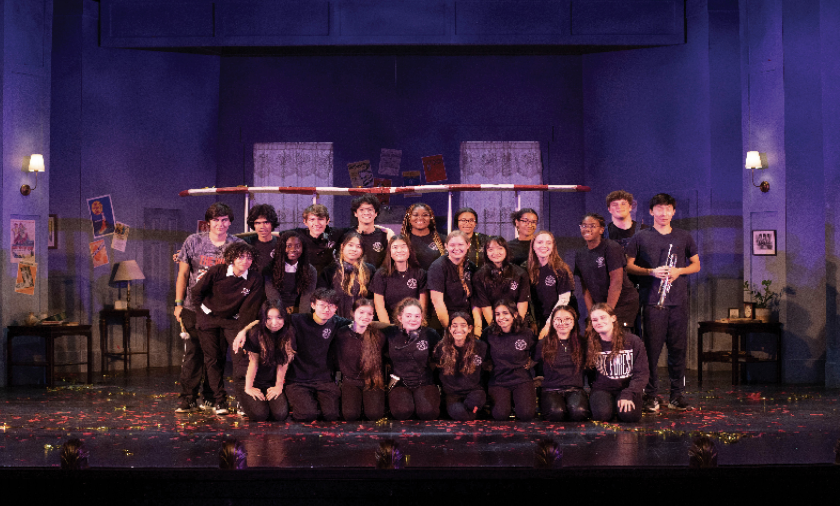Wednesday, December 4
Backstage With the Periwig Tech Crew
Sonia Lackey ’25 in Features | January 13, 2023

Before every theatrical production, Lawrenceville’s tech crew prepares the set, props, lights, sound, and cues for every shift happening behind the scenes weeks before opening night, ensuring that everything runs smoothly. The weight of every Lawrenceville show rests on the back of our Periwig tech crew, from the stage manager to the prop runners. So, how does the crew prepare for and communicate during productions? Here’s a brief overview of what really goes on behind the scenes.
Within the complex organization of the Periwig Club, each and every individual has a unique role that serves as a gear in a well-oiled machine. Over the past few months, every member of the crew was thoroughly committed to working on the Fall Musical, The Drowsy Chaperone. The crew started production during the first week of school and worked until the show’s debut in October so that they could do “the impossible and [present] a believable and convincing stage to the audience,” according to Jack Chou ’23, this year’s Co-Head of Tech and Co-President of the Periwig Council. Chou oversees every technical piece of each Periwig production, from building set pieces to the sound and lighting operations.
Each of these functions is also overseen by specific representatives, such as the Sound Representative, Philip Burgess ’24, and Lighting Representative, Luke Park ’24. In every one of these roles, the crew members are all “focusing on one goal,” according to Co-Head of Tech Lily Hooge ’24. What is this goal? In the words of Chou, the Periwig crew focuses on “bringing [the audience] into another reality.”
So, how does the Periwig crew achieve this goal? Before the show, many transitions need practice during run-throughs, and everything needs to be prepared well ahead so the actors can focus on delivering a great performance. Weeks in advance, props are found or built and every movement backstage is choreographed into a dance of lighting cues and set changes that fall into place during the production. For example, Frances Hsu ’23 and Sonia Singhal ’24 were respectively the Assistant Head of Tech and Assistant Prop Master during the Fall Musical. It was Hsu’s job to keep all crew members on task while preventing injury and ensuring that everyone stays safe while working. In addition to building and preparing the sets, Hsu teaches members of the backstage crew how to paint set-pieces work with the props. Hooge stated that Singhal and Hsu “try really hard to keep everyone and everything safe.”
Additionally, during the musical, it was their job to make “sure all the props were where they needed to be and…[make] sure that all of the characters had their props when they needed them,” according to Singhal. Backstage, every member of the crew would receive cues over the headsets from Stephanie Xu ’23, the Production Stage Manager, who would be watching the show to call these cues. All deck crew members need to receive these messages to complete transitions on time, ranging from moving set pieces on and off stage to altering the lighting. Behind the scenes, commitment and clear communication are necessary so the crew and the actors can put on a production for the audience.
This commitment varies greatly from student to student, ranging from a couple of hours a week to up to 10 hours a week for those who are extremely involved in Periwig. Many members of the crew help out in general work on set if their specific task cannot be completed at the time. According to Park, “Although I do lights, a lot of my commitment is also…expanded from that.” Before large productions, roles can become much more flexible, depending on where the show needs the most help. The backstage crew often branch out from their individual roles if they have extra time. However, many crew members agree that prioritizing their time and being willing to ask for extensions when needed helps them manage their busy Lawrenceville schedules. Burgess stressed the importance of being willing to reach out to his teachers, because if the students are unable to ask for help, it can become difficult to handle the Lawrenceville workload.
Although Periwig can be a large time commitment, each tech member noted how the community was the most important part. According to Hooge, “There’s no other community on campus like Periwig…It’s just a group of people who love each other and love what they do.”
Burgess emphasized that he “really appreciated the community that [he] found with [Periwig].” Each member ended by sharing their love for Periwig and the memories they have gained from shared experiences, such as playing games of Koomcha before every production or laughing over set mishaps. One piece of advice shared across most interviews was that you should not “be afraid to try new things at Lawrenceville, whether it is a new sport or activity,” according to Chou.
Many of the members of the tech crew found Periwig through friends or because they wanted to just try something new, but in the words of Hooge, “Everyone at Lawrenceville should try Periwig at least once…[even] if you’ve never been involved; if you want to learn how to use power tools, you should really come to the scene shop!”
Related Articles
- Little Women Adaptations and American Feminism Mira Ponnambalam ’26
- Making the Most of Consultation Michael Meng ’26
- Behind the Scenes of School Meeting Performances Isabelle Lee ’27
- Sundays @ Lawrenceville Bunny Henault-Bassett ’26
- Dia de Los Muertos: A Celebration of the Dead Angel Xin ’26
Recent Articles
- Analysis of Taylor Swift’s “tolerate it” Melina Kyriakopoulos ’27
- The Past, Present, and Future of The Disciples Angel Xin ’26
- Go to the Fall Dance Series! Jane Shindnes ’26
- For the Love of Latin Aileen Ryu ’25
- How to "Still Be Friends"